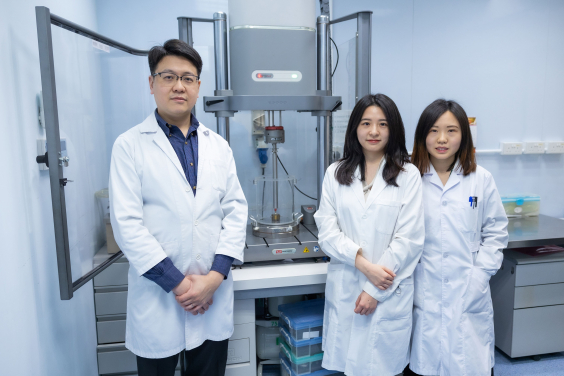Media
HKU Dentistry invents new material to replace extracted human teeth for dental research
27 Feb 2023
- 1 / 5
- 2 / 5
- 3 / 5
- 4 / 5
- 5 / 5
Extracted human teeth have long been used in conducting dental research, such as evaluating dental ceramic materials as a crown restoration on tooth. It is an inexpensive and straightforward process that simulates clinical situations. However, the collection and use of extracted human teeth is becoming increasingly difficult given the concerns about COVID-19, size-standardisation issues, and also time constraints. All these factors have prompted a need for dentine analogue materials that could potentially substitute extracted human teeth in laboratory-based mechanical and fatigue tests.
A research team led by Dr James Tsoi, Associate Professor in Dental Materials Science from the Faculty of Dentistry at the University of Hong Kong (HKU), together with colleagues from Wuhan University, China, and Drexel University, USA, investigated new elliptical frustums of fibre-reinforced composite materials and compared their properties to that of human dentine.
The materials were tested for their mechanical strength, elastic modulus, indentation hardness and fatigue behaviour. Fatigue behaviour indicates the tenacity of materials under varying loads. The positive results showed that the dentine analogue materials analysed can be used as a replacement for human-extracted teeth.
The study entitled “Which dentine analogue material can replace human dentine for crown fatigue test?”, has been published online in Dental Materials. Based on this study, a dental company contracted the Faculty of Dentistry to test commercial ceramic products using the same methodology.
The researchers uniformly fabricated the new dentine analogue materials with specific size and shape mimicking natural teeth, adhesively bonded to lithium disilicate crowns, and subjected to fatigue loading — the restorations showed comparable fatigue failure load and lifetime (durability) to those based on extracted human teeth. This implies that the materials can be well used in lieu of human-extracted teeth.
Finite element analysis, an important method to simulate a physical phenomenon using a numerical technique, also showed promising results. Similar stress levels and distributions between dentine analogue materials and extracted human teeth were observed. Notably, it is pivotal that the new materials have similar elastic properties and fatigue performance to human dentine if researchers want to use them for laboratory fatigue tests.
“This study evaluated the mechanical properties and fatigue behaviour of dentine analogue materials experimentally, analytically and numerically, and found a material with spectacular size and shape can reliably replace human dentine as the substrate in a ceramic crown fatigue test,” said principal investigator Dr James Tsoi.
“We hope this study can help researchers who are facing the problem of inadequate extracted human teeth and facilitate predictable laboratory research with the aid of dentine analogue materials,” he added.
The study was supported by the General Research Fund (GRF). Its preliminary results were presented by Ms Yanning Chen, a co-investigator, at the Academy of Dental Materials Annual Meeting 2022 and awarded with the Student Travel Award.
Please click here for the article entitled “Which dentine analogue material can replace human dentine for crown fatigue test?”
The research team
Faculty of Dentistry, the University of Hong Kong
Principal Investigator
Dr James Tsoi, Associate Professor in Dental Materials Science
Co-Investigators
Ms Yanning Chen, PhD student in Dental Materials Science
Ms Xuedong Bai, PhD student in Dental Materials Science
Dr Edmond Ho Nang Pow, Clinical Associate Professor in Prosthodontics
Wuhan University
Professor Cui Huang, Department of Prosthodontics, School & Hospital of Stomatology
Drexel University
Mr Ebrahim Maghami, PhD Candidate at Department of Mechanical Engineering and Mechanics
Media Enquiry:
Ms Melody Tang, Senior Communications Officer
Faculty of Dentistry, the University of Hong Kong
Tel: 2859 0494 / Email: melodytang@hku.hk





